
London: The UK government on Sunday denied a newspaper report saying that it was seeking closer ties with the European Union, just three years after leaving the bloc.
The Sunday Times cited an unnamed minister as saying that the government was pursuing a Swiss-style relationship with the 27-nation EU.
But a London government spokesperson called the story "categorically untrue".
"This government is focused on using our Brexit freedoms to create opportunities that drive growth and strengthen our economy," he said.
Switzerland has a free trade deal with the EU and bilateral accords covering individual economic sectors. The agreements give Switzerland direct access to key sectors of the EU's internal market without it being a fully-fledged member of the bloc.
In Switzerland's case, internal market access includes the free movement of people and mutual recognition of standards.
However, the Sunday Times reported that while the UK was prepared to pay into EU coffers, it would not accept a return to freedom of movement.
"Brexit means we will never again have to accept a relationship with Europe that would see a return to freedom of movement, unnecessary payments to the European Union or jeopardise the full benefit of trade deals we are now able to strike around the world," the UK government spokesman said.
Health Secretary Steve Barclay, a former Brexit minister, earlier told Sky News: "I don't recognise this story at all."
"I don't support that. I want to maximise the opportunities that Brexit offers," he added.
The Sunday Times said the move, which would be deeply unpopular with Conservative Brexit-supporting MPs, could take place over the next decade in a bid to reduce current trade barriers.
Britain voted to leave the EU in 2016 and finally reached a deal with the EU three years later.
Unable to get it through parliament, then prime minister Boris Johnson called a general election and made the deal a key plank of his manifesto.
He won a landslide election, allowing the agreement to become law.
But Barclay admitted the Brexit deal had created "difficulties", with "greater friction" over trade.












